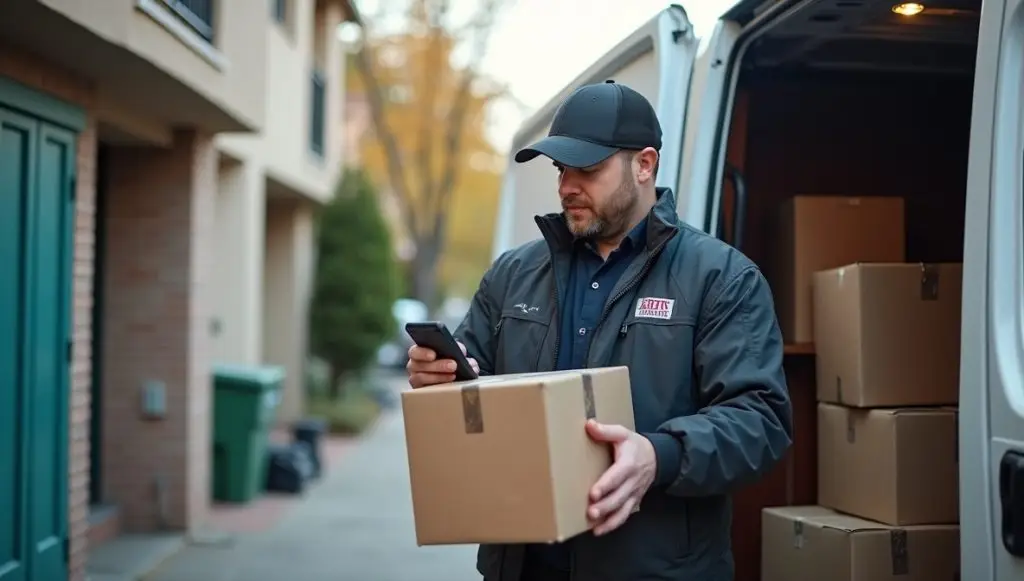Illinois education worker background checks have become increasingly complex following recent DCFS regulatory updates and expanded fingerprinting requirements. These changes now affect dual-purpose employees working across educational and childcare settings. This comprehensive guide addresses the critical intersection of Illinois State Board of Education (ISBE) requirements and DCFS childcare licensing standards. It provides HR administrators and education professionals with actionable compliance strategies for navigating overlapping background verification protocols in 2025.
Key Takeaways
- Illinois requires separate background check processes for education workers through ISBE and childcare workers through DCFS, with dual-purpose employees needing both clearances
- Fingerprint-based background checks became mandatory for all Illinois education workers in 2022, with LiveScan electronic fingerprinting expediting the 4-6 week processing timeline
- DCFS childcare licensing background checks cost between $65-$85 per applicant and must include fingerprinting, state registry checks, and federal criminal history searches
- Illinois substitute teachers face identical background check requirements as full-time educators, including fingerprinting, state criminal checks, and CANTS registry verification
- Recent 2024 DCFS legislative updates expanded disqualifying offenses and reduced administrative processing times from 8-10 weeks to 5-7 weeks for childcare workers
- Educational institutions operating after-school programs or on-site childcare must maintain dual compliance systems, requiring employees to clear both ISBE and DCFS background protocols
- Background check validity periods differ between systems: ISBE educator licenses require renewal every five years while DCFS requires re-screening every three years for childcare staff
- Non-compliance with Illinois education background check requirements can result in $500-$1,000 daily fines per violation and immediate license suspension for educational facilities
Understanding Illinois Education Worker Background Check Requirements
Illinois maintains one of the nation's most comprehensive background screening frameworks for education workers. The state administers distinct requirements through multiple agencies. The Illinois State Board of Education (ISBE) oversees background checks for traditional K-12 educators. Meanwhile, the Department of Children and Family Services (DCFS) manages screening for childcare workers. This dual-system approach creates compliance challenges for HR professionals managing employees who serve both populations.
Following 2022 legislative changes, all individuals working in Illinois educational settings must undergo fingerprint-based criminal history checks. The requirements also include state child abuse registry searches and sex offender database verification. These checks must be completed before beginning employment. Workers cannot start their jobs until these screenings are complete. The typical Illinois teacher background check process takes four to six weeks from fingerprinting to final clearance.
The complexity intensifies for dual-purpose workers who transition between traditional classroom settings and childcare environments. These employees include teachers working in school-based early childhood programs or after-school care facilities. They require clearance through both systems. ISBE credentials alone do not satisfy DCFS licensing requirements for childcare settings. Understanding which background check protocols apply to specific job functions prevents costly compliance gaps. This knowledge protects institutions from regulatory penalties that can reach $1,000 per day for violations.
Who Needs Illinois Teacher Background Check Clearance
All individuals employed by Illinois educational institutions in roles involving student contact require comprehensive background screening. Employment status and hours worked do not affect this requirement. The mandate applies regardless of whether someone works full-time or part-time. Illinois expanded these requirements significantly in 2022. The expansion closed previous loopholes that allowed some employees to bypass thorough vetting.
Illinois requires background checks for the following positions:
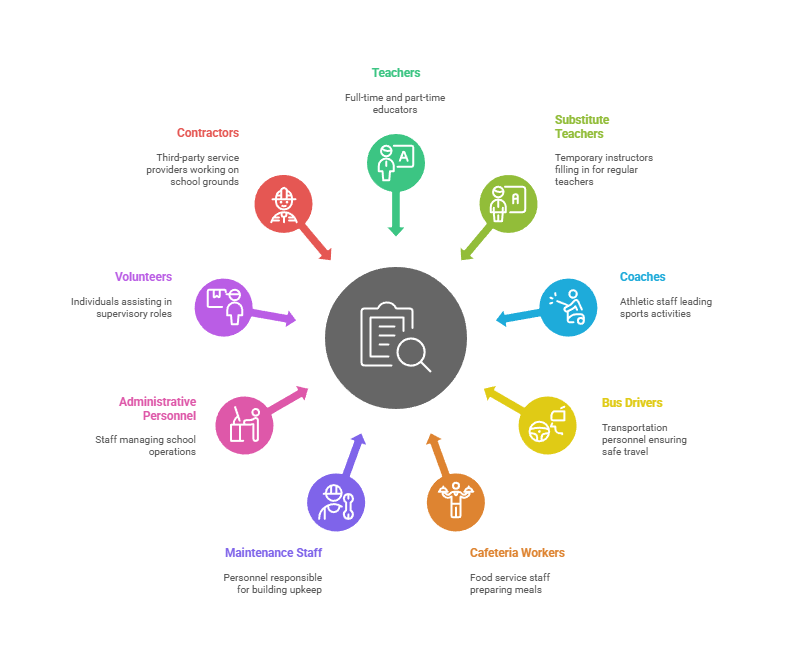
- Full-time teachers and part-time instructors
- Substitute teachers and teacher's aides
- Coaches and athletic staff
- Bus drivers and transportation personnel
- Cafeteria workers and food service staff
- Maintenance staff with building access
- Administrative personnel
- Volunteers serving in supervisory capacities
- Contractors and third-party service providers working regularly on school grounds
This comprehensive coverage expands compliance obligations beyond direct employees. Educational institutions must track background check status for all individuals with potential student contact. Recent enforcement actions have targeted schools that failed to properly screen contractors and volunteers.
Illinois Substitute Teacher Background Check Process
The Illinois substitute teacher background check process mirrors requirements for permanent educators. Previous distinctions that allowed abbreviated screening for temporary staff no longer exist. Districts cannot permit substitute teachers to begin work while "background check pending." Emergency hiring exceptions were eliminated in 2022 reforms.
Substitute teachers must complete the same multi-step verification process as full-time staff. This includes fingerprint-based FBI and state criminal history searches. Additionally, substitutes require CANTS registry verification and sex offender database checks. The process typically takes four to six weeks to complete. This timeline creates planning challenges for districts managing substitute pools.
Many school districts now maintain pre-approved substitute rosters with completed background checks on file. This proactive approach allows faster deployment when regular teachers need coverage. However, substitute clearances must stay current. Districts need renewal tracking systems to prevent expired credentials from causing compliance violations.
DCFS Childcare Licensing Background Check Standards
Illinois DCFS childcare licensing background requirements apply to all individuals working in licensed facilities. These include childcare centers, family childcare homes, group childcare homes, and day care agencies serving children under age 13. The standards extend beyond direct caregivers. They include administrators, cooks, janitors, drivers, and any person with unsupervised access to children during operational hours. DCFS background checks involve three distinct components that work together to create a comprehensive screening system.
The three required DCFS screening components include:
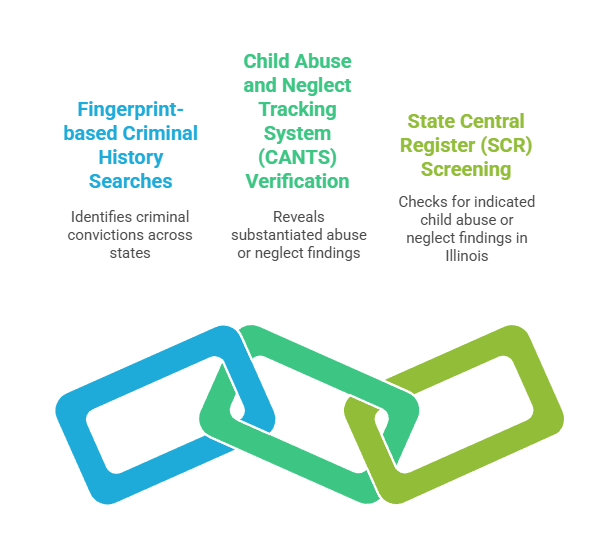
- Fingerprint-based criminal history searches: State and federal databases identify criminal convictions at all levels. This includes misdemeanor and felony records. The FBI check reveals crimes committed in other states. These may not appear in Illinois-only searches. This component costs approximately $65 per applicant.
- Child Abuse and Neglect Tracking System (CANTS) verification: Registry searches reveal any prior substantiated abuse or neglect findings from DCFS investigations. Even unfounded allegations may appear if they meet specific criteria. This free search must be completed within seven days of application.
- State Central Register (SCR) screening: System checks for indicated child abuse or neglect findings from investigations occurring in Illinois. This overlaps with CANTS but captures additional historical data. Processing typically takes three to five business days.
These multiple layers ensure thorough vetting of all childcare workers. Each component serves a specific protective function. Consequently, passing one check does not guarantee overall clearance. Disqualifying information may appear in other databases.
Illinois Education Background Check Fingerprinting Process
Illinois education background check fingerprinting became mandatory for all education workers in 2022 under Public Act 101-0531. The law eliminated paper-based ink fingerprint cards in favor of electronic LiveScan technology. This modernization significantly reduced processing times and improved accuracy. LiveScan captures digital fingerprint images that transmit directly to state and federal databases. Transmission occurs within minutes of collection.
Applicants must schedule fingerprinting appointments at authorized LiveScan locations throughout Illinois. The Illinois State Police maintains over 200 approved vendors statewide. Most appointments last 15-20 minutes. Valid government-issued photo identification is required. Applicants receive a Transaction Control Number (TCN). This allows them to track processing status online through the ISBE background check portal.
The fingerprinting fee structure includes multiple components. The LiveScan vendor charges $42 for fingerprint capture and electronic transmission. The Illinois State Police assesses a $20 state processing fee. The FBI charges $23 for federal criminal history searches. Total costs typically reach $85 per applicant. Some vendors charge additional service fees. Employers generally cover these expenses for new hires. However, policies vary by institution.
LiveScan Fingerprinting Requirements and Locations
LiveScan fingerprinting locations operate throughout Illinois with varying hours and appointment availability. Urban areas typically offer same-week appointments. Rural regions may require two to three weeks advance scheduling. The Illinois State Police website provides a searchable directory of all authorized vendors. This includes contact information and service hours.
Applicants must bring specific documentation to their fingerprinting appointments. Valid government-issued photo identification is mandatory. This includes driver's licenses, state ID cards, or passports. Additionally, applicants need their agency code and ORI number. Their hiring institution provides these. Some locations accept walk-ins. However, appointments are strongly recommended to avoid extended wait times.
Background Check Processing Timelines
Illinois education worker background check processing timelines vary based on several factors. Standard processing through ISBE takes four to six weeks from fingerprinting to final clearance notification. However, this timeline extends when complications arise. Out-of-state criminal history requires additional verification. This can add two to four weeks to the process.
| Processing Stage | Timeline |
| LiveScan fingerprinting transmission | 24-48 hours |
| Illinois State Police criminal history check | 7-10 business days |
| FBI federal criminal history check | 14-21 business days |
| ISBE final review and clearance | 3-5 business days |
| Total standard processing | 4-6 weeks |
Expedited processing options do not exist for Illinois education background checks. Both ISBE and DCFS process applications in the order received. Educational institutions should factor these timelines into hiring schedules. This avoids delays in staffing. Planning for six to eight weeks between job offers and start dates ensures adequate processing time.
DCFS Childcare Worker Background Check Timeline and Costs
The Illinois daycare worker background check cost ranges from $65 to $85 per applicant. This depends on the screening vendor selected. The cost includes all mandatory components required for DCFS licensing compliance. Fingerprinting represents the largest expense at $42 for LiveScan capture and transmission. State processing fees add $20. Federal FBI checks cost $23. Some screening vendors include additional administrative fees of $10-$15 for coordination services.
DCFS background check processing has improved significantly following 2024 administrative reforms. Previous timelines of eight to ten weeks have decreased to five to seven weeks for most applicants. The reduction stems from enhanced database integration between DCFS, the Illinois State Police, and the FBI. Electronic workflows replaced manual review processes. These previously created bottlenecks.
Childcare providers can access real-time status updates through the DCFS online portal. The system provides transparency into each screening component's progress. Applicants receive automated email notifications when checks complete. They also receive alerts when additional information is required. This improved communication helps childcare centers better manage hiring timelines and staffing needs.
DCFS Background Check Components
DCFS childcare licensing background requirements include several distinct verification layers. Each component addresses specific risk factors. They serve unique protective functions. Applicants must clear all components before receiving employment authorization from DCFS.
The comprehensive DCFS screening process includes:
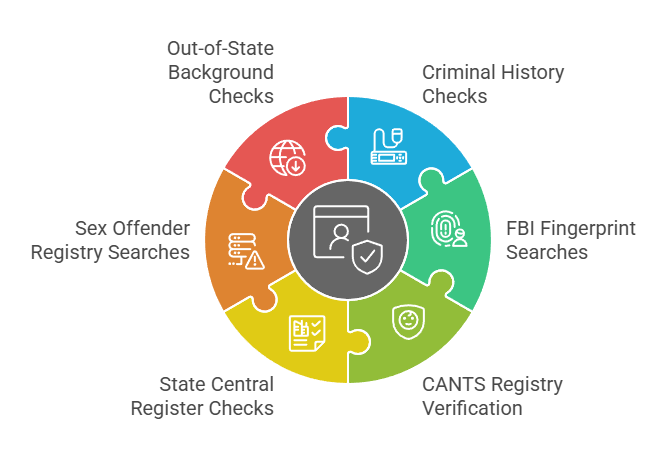
- Criminal history checks through Illinois State Police databases
- FBI fingerprint-based federal criminal background searches
- CANTS registry verification for child abuse and neglect findings
- State Central Register checks for indicated abuse investigations
- Sex offender registry searches at state and national levels
- Out-of-state background checks for applicants with residency history in other jurisdictions
Applicants with prior residency in other states face extended processing times. DCFS requires background checks from each state where the individual lived within the past five years. Coordinating these multi-state searches can add three to six weeks to the standard timeline. Some states charge additional fees for out-of-state requests. This increases total background check costs.
Disqualifying Offenses for Childcare Workers
DCFS maintains strict guidelines regarding disqualifying offenses for childcare workers. The 2024 legislative updates expanded the list of crimes that result in permanent employment bars. These changes aligned Illinois standards with federal childcare licensing requirements. The alignment follows the Child Care and Development Block Grant Act.
Permanent disqualifying offenses include violent felonies, sex crimes, child abuse or neglect convictions, and drug trafficking charges. Certain misdemeanors also trigger automatic disqualification. This particularly applies to crimes against children or domestic violence. Additionally, any indicated finding in the CANTS registry within the past five years prevents childcare employment. This applies regardless of whether criminal charges were filed.
Some offenses allow for waiver consideration after specific waiting periods. Non-violent misdemeanors more than seven years old may receive approval through DCFS discretionary review. However, the waiver process requires extensive documentation. It typically takes three to four months to resolve. Childcare providers should not hire individuals with disqualifying offenses while waiver applications are pending. This violates licensing standards.
Managing Dual Compliance for Education and Childcare Workers

Educational institutions operating both traditional academic programs and licensed childcare services face unique compliance challenges. These hybrid facilities must maintain separate background check systems for ISBE and DCFS requirements. Employees who work across both settings need clearance through each system. Credentials from one agency do not satisfy the other's requirements. This dual compliance framework significantly increases administrative burden and costs for affected institutions.
School-based early childhood programs represent the most common dual-compliance scenario. Teachers in these programs deliver educational services that fall under ISBE jurisdiction. However, if the program holds DCFS childcare licensing, those same teachers must also clear DCFS background screening. Similarly, after-school programs operating in K-12 schools require DCFS clearance. This applies even when staffed by ISBE-credentialed teachers.
HR directors at dual-purpose facilities must implement tracking systems. These monitor both clearance types for each employee. Background check validity periods differ between systems. This creates renewal schedule complexity. ISBE credentials remain valid for five years tied to educator license renewal cycles. In contrast, DCFS requires re-screening every three years for childcare staff. Failing to maintain current clearances in both systems exposes institutions to regulatory penalties from multiple agencies.
Documentation Requirements for Dual-Purpose Employees
Dual-purpose employees must maintain separate credential files for ISBE and DCFS compliance. Educational institutions cannot combine documentation from both systems into a single personnel file. This creates compliance risks. Each agency conducts independent audits using different documentation standards and retention requirements.
ISBE requires the following documentation on file:
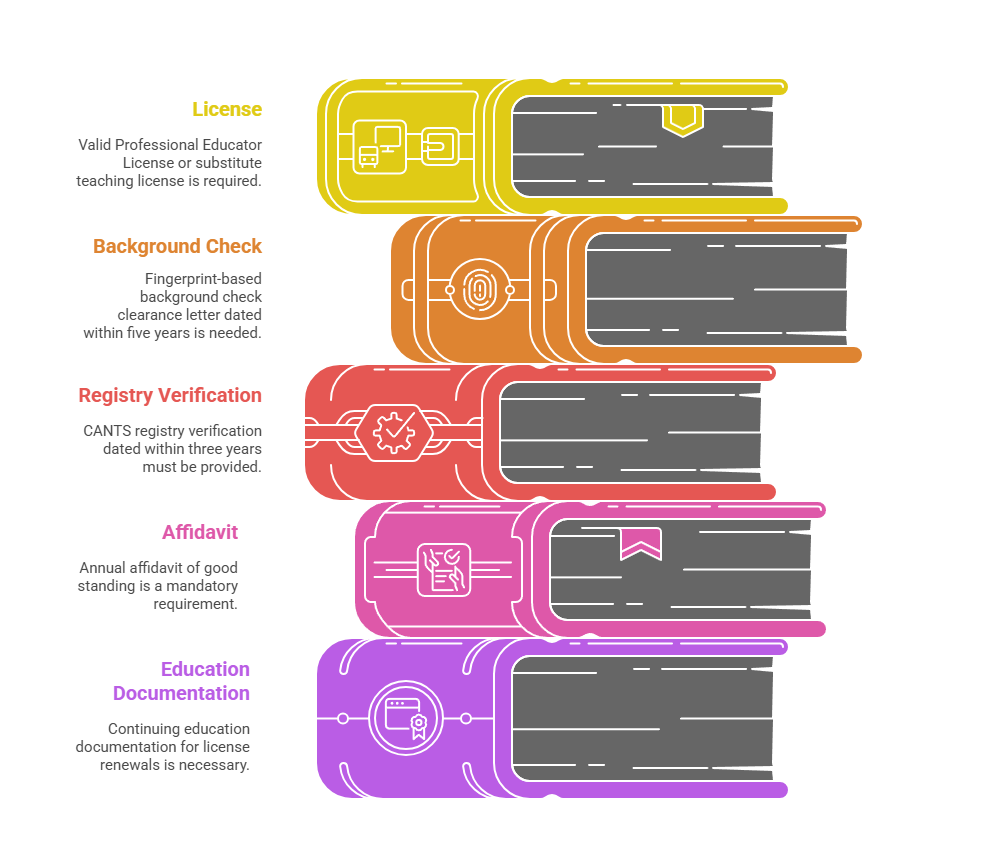
- Valid Professional Educator License (PEL) or substitute teaching license
- Fingerprint-based background check clearance letter dated within five years
- CANTS registry verification dated within three years
- Annual affidavit of good standing
- Continuing education documentation for license renewals
DCFS mandates separate documentation. This includes original clearance letters and CANTS registry verification updated every three years. Annual health examinations are required. Training certificates for mandated reporter requirements must be maintained. Additionally, DCFS requires employment eligibility verification forms. These differ from ISBE personnel records. Maintaining dual documentation systems requires dedicated compliance staff and robust tracking mechanisms.
Cost Analysis for Hybrid Facility Compliance
Managing dual background check compliance creates significant financial impacts for hybrid educational facilities. Institutions must budget for duplicate screening costs. Extended processing timelines delay employee start dates. Administrative personnel dedicated to compliance tracking add costs. These expenses often catch smaller facilities off-guard during budget planning cycles.
| Cost Category | ISBE Requirements | DCFS Requirements | Total Per Employee |
| Fingerprinting and processing | $85 | $85 | $170 |
| Initial background checks | Included | Included | Included |
| CANTS verification | $0 | $0 | $0 |
| Renewal frequency | Every 5 years | Every 3 years | Variable |
| Administrative tracking (annual) | $50 | $75 | $125 |
These direct costs exclude indirect expenses. These include delayed hiring, compliance software systems, and staff training on dual requirements. A 50-employee hybrid facility can expect to spend $8,500 on initial background checks. Ongoing annual compliance costs exceed $6,000. These figures increase substantially when accounting for employee turnover. The need for substitute staff clearances also adds costs.
Illinois Background Check Renewal and Validity Periods
Background check validity periods in Illinois vary significantly between ISBE and DCFS systems. Understanding these differences prevents compliance lapses. These can result in immediate employment termination and facility penalties. ISBE ties background check validity to educator license renewal cycles. These occur every five years. Educators must complete new fingerprint-based background checks as part of the license renewal process. The five-year cycle aligns with continuing education requirements. It ensures regular re-screening of all credentialed staff.
DCFS requires more frequent re-screening for childcare workers. Background checks remain valid for only three years from the clearance date. After three years, childcare workers must undergo complete re-screening. This includes new fingerprinting, CANTS verification, and criminal history checks. The three-year cycle applies regardless of whether the individual maintains employment with the same facility. It also applies when transferring to a new childcare provider.
Tracking these staggered renewal schedules presents substantial administrative challenges for HR professionals. A teacher working in a school-based childcare program must renew ISBE credentials on a five-year schedule. Simultaneously, they must maintain DCFS clearance on a three-year cycle. The non-aligned timelines require careful calendar management to prevent lapses. Expired credentials prohibit individuals from working in their respective settings immediately upon expiration. No grace periods exist for either system.
Renewal Process Requirements
The renewal process for Illinois education worker background checks follows similar procedures to initial screening. Educators renewing ISBE credentials must schedule new LiveScan fingerprinting appointments at authorized vendors. The state does not accept previous fingerprint records for renewal purposes. This applies even if the initial screening occurred recently. This policy ensures the most current criminal history information is reviewed.
DCFS renewal procedures mirror initial childcare worker screening. All three components must be completed anew. These include fingerprinting, CANTS verification, and criminal history checks. The system does not offer abbreviated renewal options for long-term employees with clean records. Costs remain identical to initial screening. This typically runs $65-$85 per renewal cycle.
Proactive renewal management is essential for maintaining continuous employment authorization. HR administrators should initiate renewal processes three to four months before expiration dates. This timing accommodates the four to six week processing period. It provides buffer time for unexpected delays. Facilities that wait until credentials expire face mandatory work suspensions for affected employees. This continues until new clearances are issued.
Compliance Penalties and Enforcement Actions
Illinois education background check requirements carry substantial penalties for non-compliance. The Illinois State Board of Education conducts random audits of school districts and educational institutions. These verify background check compliance. DCFS performs similar inspections of licensed childcare facilities. Both agencies maintain zero-tolerance policies for employment of individuals without proper clearances. Enforcement actions escalate quickly when violations are discovered.
ISBE penalties for background check violations include several serious consequences. Immediate employment termination of non-compliant workers is required. Fines range from $500 to $1,000 per day per violation. Formal reprimands are placed in institutional compliance records. Severe or repeated violations can result in revocation of school operating licenses. Additionally, individual administrators who knowingly permit non-compliant employees to work face personal disciplinary actions. These include professional license suspensions.
DCFS enforcement measures are equally stringent. Childcare facilities operating with staff lacking proper background clearances face immediate licensing suspension. This action requires facility closure until compliance is achieved. Financial penalties start at $500 per violation. They escalate based on violation severity and duration. DCFS publishes compliance violations in public databases. This creates reputational damage that affects enrollment and community trust. Facilities with multiple violations may face permanent license revocation. This effectively ends their ability to operate childcare services in Illinois.
Recent Enforcement Case Examples
Illinois regulatory agencies have intensified enforcement actions in recent years. This follows several high-profile incidents involving inadequately screened education workers. In 2023, ISBE issued citations against 47 school districts for background check compliance failures. These cases involved substitute teachers working without completed criminal history checks. They also included expired background clearances for long-term staff. Penalties in these cases ranged from $2,500 to $18,000 per district.
DCFS enforcement actions have similarly increased. During 2023-2024 inspections, 127 childcare facilities received violations for background check non-compliance. Common violations included employing workers while background checks were still processing. Failing to complete required CANTS verifications was frequent. Not obtaining out-of-state criminal history checks for employees with prior residency elsewhere also occurred. Fifteen facilities faced temporary license suspensions. This resulted in operational closures averaging 12-18 days while compliance was achieved.
Developing Effective Compliance Management Systems
Successful background check compliance requires robust tracking systems and clear procedural protocols. Educational institutions should implement digital compliance management platforms. These automate renewal reminders and track expiration dates. Such systems prevent the manual tracking errors that frequently lead to compliance lapses. Many specialized HR software solutions offer modules designed specifically for education sector background check management.
Designated compliance officers should oversee all background check processes. This individual serves as the primary liaison with ISBE and DCFS. They manage vendor relationships with fingerprinting services. They also conduct internal audits to identify potential compliance gaps. Organizations with 50 or more employees typically require dedicated full-time compliance staff. Smaller institutions may assign these duties to HR directors with appropriate training and support systems.
Regular compliance audits help identify potential issues before regulatory inspections. Quarterly internal reviews should verify that all employees have current background clearances. Documentation must be properly filed and accessible. Renewal schedules must be followed. New hire onboarding must include completed screenings before work begins. These proactive measures significantly reduce the risk of costly enforcement actions. They protect vulnerable populations served by education and childcare facilities.
Working with Background Check Vendors and Service Providers
Selecting appropriate background screening vendors significantly impacts compliance success for Illinois educational institutions. The market includes numerous providers offering varying service levels, technology platforms, and pricing structures. However, not all vendors understand the specific requirements of Illinois education and childcare background checks. Institutions must carefully evaluate vendor capabilities before establishing service relationships.
Qualified vendors should demonstrate expertise in both ISBE and DCFS screening requirements. They must maintain authorization as LiveScan fingerprinting providers through the Illinois State Police. Additionally, vendors should offer integrated platforms that manage multiple screening components. This is preferable to requiring separate processes for each background check element. Technology integration streamlines workflows. It reduces the administrative burden on HR staff.
Key vendor selection criteria include several important factors. Electronic result delivery systems are essential. Real-time processing status updates help track progress. Dedicated account management for institutional clients provides support. Compliance with Fair Credit Reporting Act (FCRA) requirements is mandatory. Vendors must also demonstrate data security measures that protect sensitive applicant information. Educational institutions should request references from similar organizations. They should verify the vendor's history of service reliability before committing to contracts.
Evaluating Vendor Service Agreements
Vendor service agreements for background screening should clearly define turnaround times, pricing structures, and service guarantees. Standard agreements typically promise result delivery within specified timeframes. However, institutions should understand that vendors control only their portion of the process. State and federal database processing times fall outside vendor control. This means guaranteed timeframes may only apply to vendor-managed components.
Pricing transparency is essential for budget planning. Some vendors advertise low base prices but add multiple fees for various services. Comprehensive agreements should itemize all costs. These include LiveScan fingerprinting, state processing fees, and federal FBI checks. CANTS verification charges should be listed. Any administrative or technology platform fees must be disclosed. Additionally, agreements should address pricing for renewal screenings. Volume discounts for large institutions processing many background checks annually should be clarified.
Service agreements must address error resolution procedures. Occasionally, background checks produce incorrect information due to database errors or identity confusion. Qualified vendors provide clear processes for disputing inaccuracies and obtaining corrected results. The agreement should specify response times for error resolution. It should clarify which party bears costs for re-screening due to vendor errors.
Conclusion
Illinois education worker background checks require careful navigation of complex regulatory frameworks administered by multiple state agencies. Educational institutions and childcare facilities must maintain robust compliance systems. These must address both ISBE and DCFS requirements. This is particularly important when managing dual-purpose employees who serve both populations. The 2022 and 2024 legislative updates have strengthened screening requirements while improving processing efficiency. However, compliance costs and administrative demands have increased correspondingly. Organizations that invest in proper vendor relationships, dedicated compliance staff, and automated tracking systems can successfully manage these obligations while protecting the children they serve and avoiding costly enforcement actions.
Frequently Asked Questions
How long does an Illinois teacher background check take to complete?
The Illinois teacher background check process typically takes four to six weeks from fingerprinting to final clearance. Processing times vary based on FBI database volume, out-of-state criminal history verification needs, and ISBE administrative review workflows. Districts should plan for six to eight weeks when hiring new staff to accommodate potential delays.
Can substitute teachers work in Illinois schools while their background check is processing?
No, Illinois law prohibits substitute teachers from working before background checks are complete. The 2022 legislative reforms eliminated emergency hiring exceptions. These previously allowed temporary work during processing. Schools must wait for full clearance before allowing substitute teachers any student contact, regardless of urgent staffing needs.
How much do Illinois education background checks cost?
Illinois education background checks cost approximately $85 per applicant. This includes LiveScan fingerprinting ($42), state processing ($20), and FBI federal checks ($23). DCFS childcare screenings range from $65-$85 with similar fee structures. Dual-purpose employees requiring both ISBE and DCFS clearances face combined costs around $170 per initial screening.
What disqualifies someone from working in Illinois childcare facilities?
DCFS permanently bars individuals with violent felonies, sex offenses, child abuse convictions, and drug trafficking charges from childcare employment. Any indicated CANTS registry finding within five years also disqualifies applicants. Some non-violent misdemeanors older than seven years may receive waiver consideration through discretionary DCFS review processes.
Do Illinois background check requirements apply to school volunteers?
Yes, Illinois requires background checks for all volunteers with supervisory responsibilities or regular unsupervised access to students. The requirements apply regardless of volunteer frequency or duration. Schools should screen parent volunteers, field trip chaperones, and coaching assistants using the same ISBE protocols required for paid staff.
How often must Illinois education workers renew their background checks?
ISBE requires background check renewal every five years aligned with educator license renewals. DCFS mandates re-screening every three years for childcare workers. Dual-purpose employees must track both schedules independently. They must complete separate renewal processes for each system to maintain continuous employment authorization.
Can Illinois teachers transfer their background check to a new school district?
Illinois educator background checks are tied to Professional Educator Licenses rather than specific employers. Valid background clearances transfer between districts as long as the license remains current. However, if moving to a position requiring DCFS childcare clearance, separate DCFS screening is necessary regardless of existing ISBE credentials.
What happens if an Illinois education worker's background check reveals a disqualifying offense?
Individuals with disqualifying offenses receive written notification from ISBE or DCFS explaining the denial. They have rights to dispute incorrect information and request administrative review. Educational institutions must immediately terminate employment upon receiving notice of disqualifying findings. Continued employment after notification results in compliance violations and institutional penalties.
Additional Resources
- Illinois State Board of Education Educator Licensure Information System
https://www.isbe.net/Pages/Educator-Licensure.aspx - DCFS Child Care Licensing Standards and Background Check Requirements
https://www2.illinois.gov/dcfs/brighterfutures/parents/Pages/default.aspx - Illinois State Police LiveScan Fingerprinting Vendor Directory
https://isp.illinois.gov/Leep/UniformCriminalReporting - Illinois General Assembly Public Act 101-0531: Education Background Check Reform
https://www.ilga.gov/legislation/publicacts/101/101-0531.htm - DCFS Child Abuse and Neglect Tracking System (CANTS) Information
https://www2.illinois.gov/dcfs/safekids/reporting/pages/index.aspx

GCheck Editorial Team
Meet the GCheck Editorial Team, your trusted source for insightful and up-to-date information in the world of employment background checks. Committed to delivering the latest trends, best practices, and industry insights, our team is dedicated to keeping you informed.
With a passion for ensuring accuracy, compliance, and efficiency in background screening, we are your go-to experts in the field. Stay tuned for our comprehensive articles, guides, and analysis, designed to empower businesses and individuals with the knowledge they need to make informed decisions.
At GCheck, we're here to guide you through the complexities of background checks, every step of the way.




